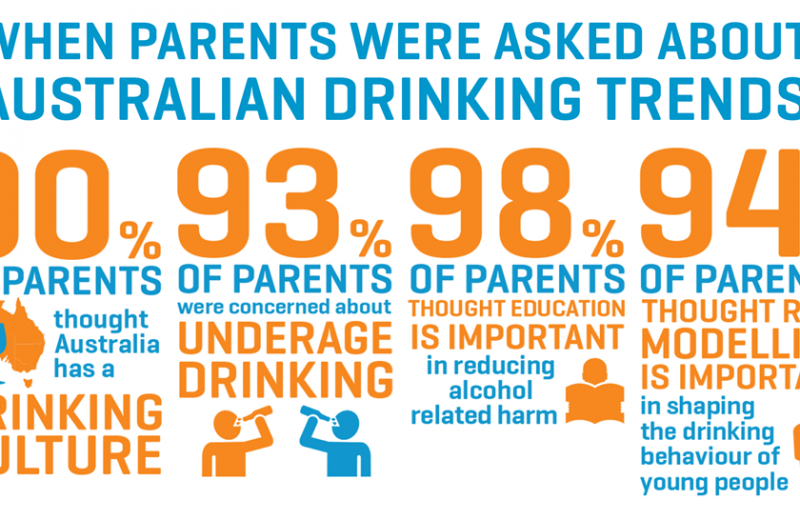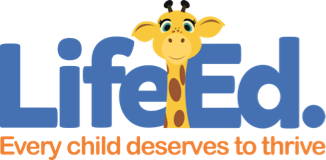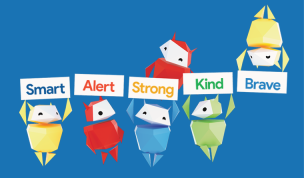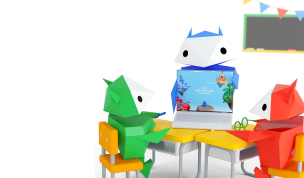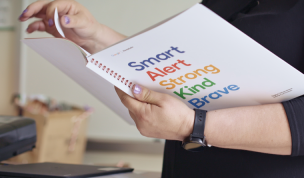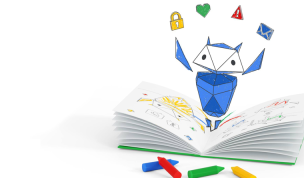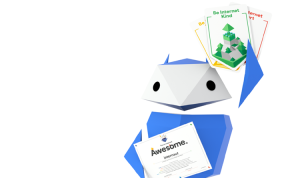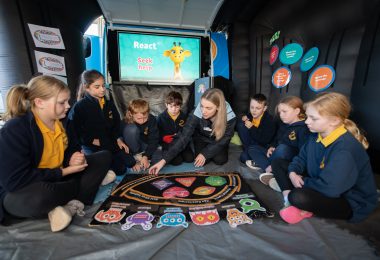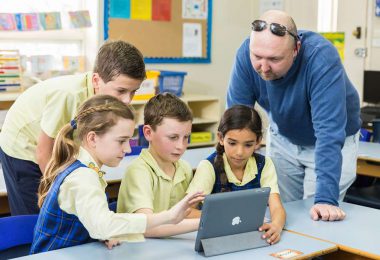2018 Parent survey
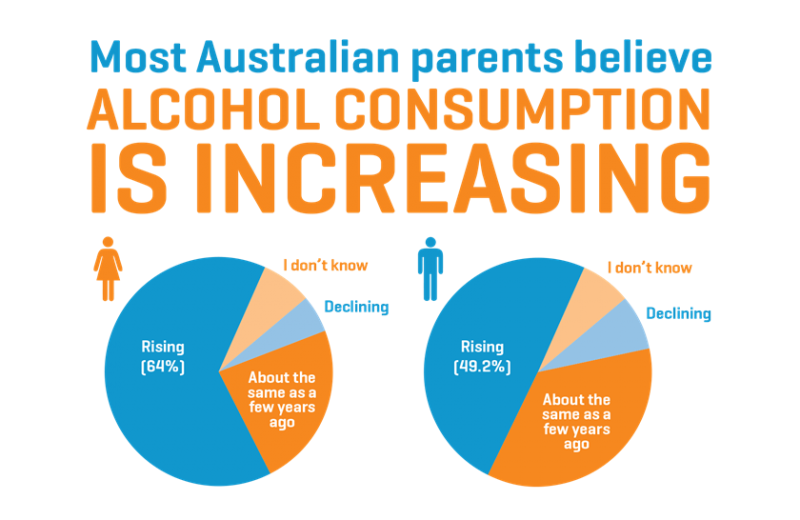
Overwhelmingly, Australian parents are concerned about underage drinking, blaming peer influence, the home environment and Australia’s drinking culture.
Released this month, our research examined the attitudes and beliefs of more than 1,000 Australian parents when it comes to alcohol and underage drinking.
Parents think that drinking is on the rise, despite national data pointing to the opposite
More than 90% of parents surveyed were concerned about underage drinking among young Australians, with 81.4% of parents admitting they are worried about the issue in relation to their own children.
Interestingly, more than 90% of parents agreed that Australia has a drinking culture, and the majority of parents believed that rates of drinking among Australian men, women and adolescents are on the rise. This is in contrast to the Australian Bureau of Statistics’ latest report which shows across the population, alcohol consumption has hit a 55-year low.
A recent study from the Australian Institute for Health and Welfare (AIHW) also confirmed that as a nation we are drinking less, and underage drinking among 12-17 year-olds was on the decline with the vast majority now abstaining from alcohol.
While parents blame the influence of peers, family and our Aussie drinking culture, most (98.1%) agreed that education is key to tackling the problem of underage drinking and its associated harms.
Almost all parents surveyed (99.4%) acknowledged the importance of parental role modelling in shaping the drinking behaviours of young people, while encouragingly, most parents (90%) indicated that they found it “easy” (50.7%) or “somewhat easy” (39.3%) to talk to their children about alcohol. Only 10% of parents said they found it “difficult” or “very difficult”.
Our drinking culture according to Australian parents
Life Ed CEO David Ballhausen said there has been a significant generational change in the way that Australians are drinking, and rather than giving themselves a hard time, parents should be commended for their efforts in shaping the next generation of healthy young Australians.
“Parents understand that the role of education – both at home and in a school setting – is important to empower their children to make safe and healthy choices,” Mr Ballhausen said.
“Over our almost 40 years of operation, approximately 6 million young Australians have been through the Life Education program, which teaches children fundamental skills in decision making, including how to navigate the influences of peer and family.
“It’s encouraging to see that this generation of parents – some of whom have been through our program themselves – are engaging with their children about alcohol and its related harms, and are having those important conversations.”
Mr Ballhausen acknowledged that there was room for improvement, with the consumption of alcohol at risky levels amongst adolescents remaining high, however there is a lot that parents can do to support their children to make good decisions.
In 2016, 15.3% of young adults aged 18–24 consumed more than 11 standard drinks on one occasion, according to the AIHW.
“Alcohol still remains the most dangerous drug in society – it is the most commonly treated drug in Australia and is linked to mental health issues and domestic violence,” Mr Ballhausen said.
2018 Life Education Parent Survey: Key findings
- More than 90.1% of parents surveyed thought Australia has a drinking culture.
- Almost 50% (49.2%) of parents surveyed thought that alcohol consumption among adult males in Australia was on the rise. 35.8% said they thought it was approximately the same as it was a few years ago, 7.8% said they thought it was declining, and 7.2% said they didn’t know.
- 64% of parents thought that alcohol consumption among adult females was on the rise. 23.5% thought it was approximately the same as it was a few years ago, 5.3% thought it was declining, and 7.2% said they didn’t know.
- More than half (53.6%) of parents thought that rates of underage drinking was on the rise. 25.8% thought it was approximately the same as it was a few years ago, 9.9% thought it was declining, and 10.7% said they didn’t know.
- 93.1% of parents were concerned about underage drinking among young Australians (25.2% very concerned, 33.9% concerned, 34% somewhat concerned). Only 6.9% said it was not a concern for them.
- When it came to their own children, 81.4% said they were concerned about underage drinking in relation to their children (27% very concerned, 23.3% concerned, 31.1% somewhat concerned). 16.4% were “not at all concerned” and 2.2% said they didn’t know.
Most parents blamed peer influence or home/family environment for underage drinking. Of the parents surveyed:
- 90.6% blamed peer influence
- 60.2% blamed home/family environment
- 58.3% blamed Australia’s drinking culture
- 38.9% blamed socioeconomic status
- 32.7% blamed alcohol marketing
- 2.8% Other/didn’t know
Note: parents could choose more than one influence.
- 98.1% of parents said education is key to tackling underage drinking (61.7% “very important”; 23.4% “somewhat important”; 13% “important”). Only 1.9% of parents thought it was “not very important” or “not at all important”.
- Almost all parents surveyed (99.4%) thought parental role modeling is important in shaping the drinking behaviours of young people.
- Most parents (90%) said they found it easy (50.7%) or somewhat easy (39.3%) to talk to their children about alcohol. 10% of parents said they found it either difficult (9.3%) or very difficult (0.7%).
